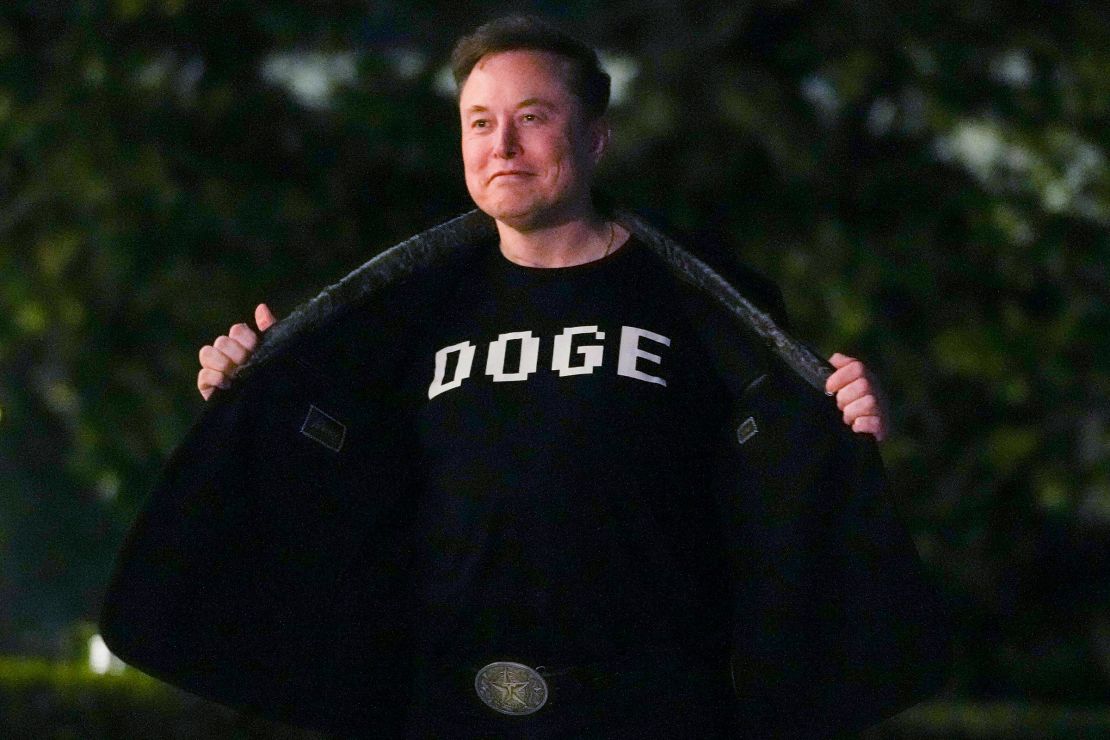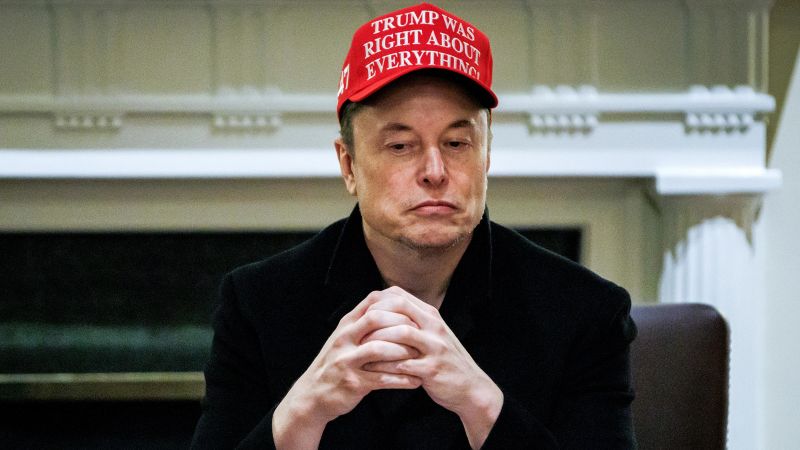CNN
—
Elon Musk’s Department of Government Efficiency has blitzed its way through federal agencies over the last two months, spawning dozens of lawsuits in its effort to shrink the federal government.
As judges take a closer look at how DOGE is operating, and what authority it exercises across the federal bureaucracy, among the many questions they’re asking is whether DOGE is actually a government agency itself.
The answer to that question, pedantic as it may sound, could have major ramifications, including whether DOGE is subject to public records laws and other statutes that require some oversight of executive branch activity.
The laws could pose a check on what Musk can do with his government-slashing project — both by granting access to what’s happening behind the scenes, and by giving legal challengers tools to potentially reverse some of his most drastic actions.
If DOGE is determined to be a government entity that wields “substantial authority independently of the President,” the public can seek the release of some of its internal records under the Freedom of Information Act.
The Trump administration is saying in court that federal agencies, rather than Musk’s DOGE initiatives, are what’s driving the cuts. That’s quite different from the dramatic, braggadocios, chain saw-waving picture Musk and President Donald Trump have painted in the public arena.
It’s also different from what government whistleblowers have described witnessing as their agencies get slashed and burned.
After retrofitting DOGE onto a preexisting government information technology office known as the US Digital Service, or USDS, the administration dispersed DOGE operatives inside a variety of government agency headquarters across Washington.
Now, in a number of lawsuits, the administration is claiming that DOGE has very little centralized organization or power, that its leaders are merely advisers, and that some of the operatives embedded across the federal bureaucracy are now directly employed by the agencies they’re overhauling.
Declarations in court from multiple government officials claim that Musk has no formal position at DOGE, and no power of his own to execute his vision for shrinking the government. They say his role is just to give counsel to the president.
The Justice Department is leaning on that argument to try to convince courts that they should not order discovery, including the production of internal documents and even depositions. Several judges appear skeptical, often pointing to public reporting and contradictory statements by government officials in other cases. But the administration has, in some cases, found a more receptive audience at the appellate level.
“There is this unusual disjunction between what Musk and his minions are actually doing, and what the administration is saying they’re doing” in court filings, said Ilya Somin, a law professor at George Mason University. “The key question is: Do courts have to accept that description on paper, which could be bogus, or can they peer through to the underlying reality?”

The recent tactics have backfired in some cases, as judges have concluded the new explanations about DOGE’s approach raise more questions than they answer — and thus could warrant more discovery.
But the administration has taken aggressive steps to get higher courts to intervene in the fundamental disputes about what DOGE is and, in some cases, secured appellate orders pausing the judges’ decisions.
Musk, meanwhile, suggested in a recent Fox News interview that the legal setbacks were the result of “bias” and “corruption” in the judiciary.
“The DC Circuit is notorious for having a very far-left bias,” Musk said, while describing the judges as having a close relationship with the nongovernmental organizations being targeted in DOGE cuts. “Does that seem like a system that lacks corruption? It sounds corrupt to me.”
Among the greatest checks on DOGE’s power within the government is the Constitution’s appointment clause, which requires that certain government leaders receive Senate confirmation. The Supreme Court has interpreted the clause to cover officials exercising “significant authority.”
Some legal challenges allege this clause, along with separation of powers principles, is being violated as Musk and his agents are allegedly calling the shots when it comes to sweeping layoffs, major funding freezes and the mass cancellation of government contracts.
One of the groups challenging DOGE’s authority revealed in court filings this month that a grant cancellation letter the group received was, according to its metadata, written by a DOGE affiliate, rather than the high-ranking Department of Education official who signed it.

The claim that the Constitution prohibits Musk from ordering agencies to make drastic changes to their operations has already persuaded a federal judge in Maryland to limit DOGE’s involvement in the dismantling of the US Agency for International Development. But Musk and DOGE’s access to USAID was restored last week by the 4th US Circuit of Appeals, which embraced the administration’s arguments that Musk has been playing the role of presidential adviser and that USAID’s disassembly had the backing of the agency’s leadership.
In another lawsuit attacking Musk’s influence, brought by Democratic state attorneys general, the administration successfully appealed the discovery order of a DC federal judge that would have required the government to answer specific questions and turn over documents shedding light on Musk’s role. The US DC Circuit’s brief, unsigned order indicated the judge, Tanya Chutkan, could not allow discovery before ruling on Trump’s legal arguments for why the lawsuit should be dismissed.
The administration’s filings with DC’s federal appeals court describe Musk as a White House adviser with no authority of his own who is entitled to broad protections of executive privilege because of the counsel he is giving to the president.
The White House last month identified Amy Gleason as the acting administrator of USDS, after judges and reporters dogged the administration for weeks about who was occupying the role.

In a case in which a watchdog group secured a court order requiring the quick release of internal documents from DOGE, the administration asked Judge Casey Cooper to reexamine his conclusion that DOGE, as it exists in USDS, was likely covered by the Freedom of Information Act and pointed to court declarations from Gleason arguing that USDS has “limited responsibilities” that are “purely advisory.”
While USDS has 79 direct employees and 10 others detailed from other agencies, there is “no formal front office or organizational chart reflecting” USDS’ “current composition,” Gleason said in a court declaration this month.
Cooper is taking a closer look at whether the Freedom of Information Act, or FOIA, applies to DOGE, but has said some of Gleason’s assertions raised their own “factual disputes” that could warrant more discovery.
A claim by Gleason that Musk does not work for USDS was “contradicted” by Trump and Musk’s own statements, Cooper wrote in an opinion this month, and he pointed to news reports of orders from the president that Cabinet secretaries cooperate with DOGE on staffing issues.
The watchdog group behind the FOIA litigation has taken up Cooper’s invitation for discovery, seeking depositions of Gleason and of Steve Davis, a longtime Musk adviser now involved with DOGE, as well as other internal information about its work.
The group, Citizens for Responsibility and Ethics (CREW), noted in its Thursday discovery request that lawyers for Musk told a judge last week, in a case concerning his company X, that he was too busy to sit for a deposition because the White House had put him “in charge of Establishing and implementing” DOGE.
“Defendants’ representations to this Court that Mr. Musk is not running DOGE are tantamount to legal gaslighting,” CREW said.
While Gleason was explaining in the FOIA case her “full-time” role at USDS, a separate case revealed she is simultaneously serving as a consultant at the Department of Health and Human Services to implement DOGE’s agenda there. The case, one of several challenging DOGE’s access to sensitive government data, hinges on the Privacy Act, which limits who within the government can access troves of confidential data collected about the American public.
In the data case, Judge John Bates has OK’d four depositions, while green-lighting other discovery requests from the challengers.
The Justice Department argued this month that Bates should reconsider that order because the administration had switched gears in how some DOGE affiliates were being deployed. At the agencies covered in the case, some DOGE representatives are now serving as direct employees, rather than just being temporarily detailed from DOGE, the administration said.
This new setup, the Justice Department argued, meant that Bates no longer needed to look under the hood at how DOGE was operating.
But Bates rejected that rationale and questioned whom those “direct hire” employees truly answered to: those above them at DOGE or at the agencies they’re also working for.
The challengers in the case will get to show the judge — and the public — what the discovery has shown to be the answer in a court filing due April 8.

